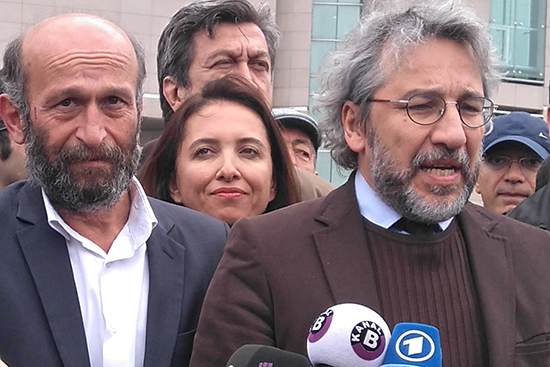New York, May 6, 2016 – The Committee to Protect Journalists condemned a Turkish court’s sentencing today of two journalists for the opposition daily Cumhuriyet.
Istanbul’s 14th Court for Serious Crimes sentenced editor Can Dündar to seven years in prison, reduced to five years and 10 months, on charges of revealing state secrets that could harm the security of the state or its domestic or foreign interests, Cumhuriyet reported. The court sentenced Ankara Bureau Chief Erdem Gül to six years in prison, reduced to five years, on the same charge. Both were acquitted of espionage and terrorism charges that could have resulted in life sentences, according to Cumhuriyet.
“Leading Turkish journalists Can Dündar and Erdem Gül were unjustly sentenced today, but what was really on trial was the Turkish criminal justice system, which is guilty of gross misconduct,” said CPJ Executive Director Joel Simon. The journalists were prosecuted over a report alleging Turkey had tried to ship arms to Islamists in Syria.
At a break in today’s proceedings, a man attempted to shoot Dündar outside the courthouse, according to press reports. Dündar was unharmed, but NTV reporter Yağız Şenkal was hit and lightly injured by a stray bullet, Şenkal told NTV.
“That someone shot at Dündar outside the court put Turkey’s instability into stark relief,” Simon added.
According to Fatih Polat — the editor-in-chief of the daily newspaper Evrensel, who was at the courthouse covering the trial — the shooter approached Dündar as he left the courthouse with his wife and shouted at Dündar that he was a “traitor,” and fired two shots, aiming low.
“We do not know who the attacker is, but we know who made us into a target. That is sufficient for us,” Dündar said after the attack, according to Polat.
While the journalists are free, pending appeal, and the court lifted a travel ban against them, they still risk a separate trial on charges of “committing a crime in the name of a [terrorist] organization without being a member.”
EDITOR’S NOTE: The headline of this text has been changed to reflect that Can Dündar was sentenced to five years and 10 months, not five years, in prison.
